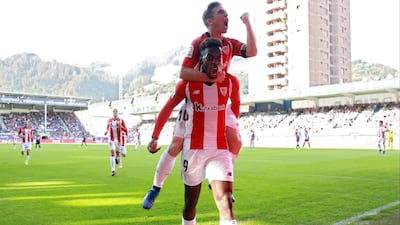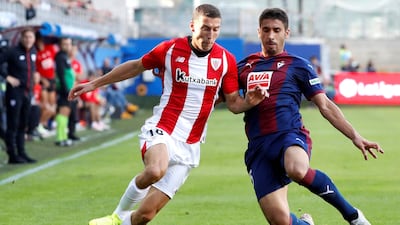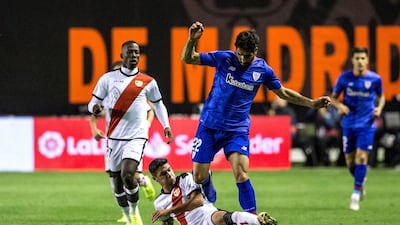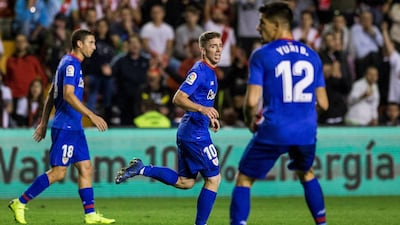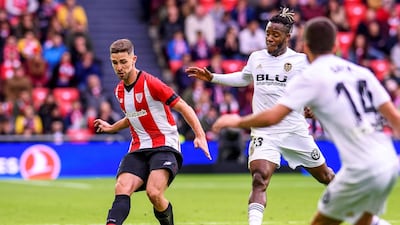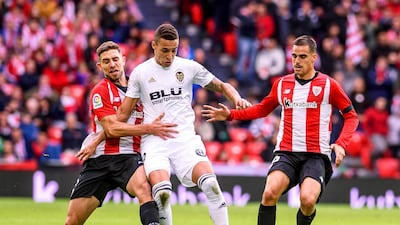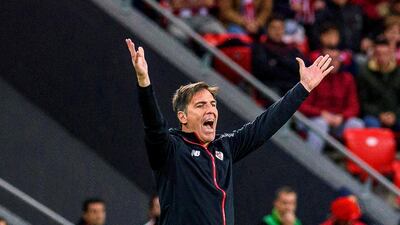Athletic Club Bilbao, Spain’s fourth most successful club, have won only one of their 10 league games so far this season and sit 17th in La Liga.
Their next two games are away at high-flying Espanyol on Monday evening and Atletico Madrid on Saturday.
The Basque giants, who play to average crowds of 38,000 in their superb new 53,000 capacity stadium overlooking the River Nervion in Bilbao’s heart, have never been relegated.
Only Barcelona, Real Madrid and Athletic can boast that, although they did finish 16th last season and their current position of 17th place looks precarious after four successive top seven finishes from 2014-17.
As football becomes more globalised, Athletic do not. They are proud to continue their century-old tradition of using players who were born or learned their football skills in the Basque Country, a highly autonomous community in north east Spain with a 2.1 million population.
It has long been a rich quarry for footballers. In 1920, Spain entered a team in the Olympics and of the 21 players in the squad, 14 were Basques.
To this day, Athletic has provided more players for the Spanish national team than any other club, including Real Madrid.
Athletic fans are also proud of their English roots. British émigrés, principally miners from the north east or ship builders from the south coast, arrived in Bilbao in the late 19th century and were the first to play football in the city, their influence retained in Athletic’s anglicised name to this day.
The strongest theory about why Athletic wear red and white stripes is that they took the shirt from Sunderland.
At the club’s Lezama training academy, where the famous San Mames arch from their old stadium stands surrounded by verdant green fields and hills 10 kilometres to the west of the Basque country’s biggest city, young boys and girls of all ages wear those red and white stripes with pride alongside the first teamers. Almost 90 per cent of Athletic’s first teamers come through their academy.
In an exclusive interview with The National, Athletic's president, former player Josu Urrutia, explains the club's position and the challenges they face.
___________
Read more
Arsene Wenger? Guti? Five candidates who could be the next Real Madrid manager
El clasico takeaways: Lights out for Julen Lopetegui, but Real Madrid players have let him down
Barcelona v Girona in Miami set to be shelved after lack of support
___________
What is success for Athletic Club?
"It goes beyond winning or losing. At Athletic Club success is inseparable from the concept of identity and, therefore, linked to the club’s unique way of competing. Success is not only an end in itself, as it might be for other teams, but also part of the journey.
"Winning the Copa del Rey would be a bigger success with our philosophy than winning the Champions League after signing Messi. In fact, signing Messi would be a complete disaster, because we would stop being what we are.
You’re a wealthy club who could sign top players. What is the state of the club’s finances?
"Financially-speaking, Athletic Club is on a better footing than at any time in its modern history. Prudence, thoroughness and honesty have been the basis for our financial management, the good results of which have gone hand in hand with great sporting performance, with Athletic regularly taking part in Europe.
"The accounts have been audited without qualifications for the past eight years. Of the €221 million (Dh922.8m) received for the full payment of release clauses, €170m have been earmarked for extraordinary investments. The remaining €51m have been added to the other €148 million generated ordinarily, leaving us with a current positive balance of €199m.
Does it frustrate you when a great young talent like your recently departed Kepa comes through the ranks and then leaves for Chelsea at 23? Is there anything you can do to stop this happening?
"It is always disappointing when a footballer you have trained from a child chooses to go somewhere other than Athletic. For us, competing in a team from your homeland makes more sense and has more merit and glory. In the words of someone who was presented with our One Club Man award, Carles Puyol: “the team that you carry in your heart”. We work to make our players feel the same way, but it’s something that runs in the whole red-and-white family, not just the club."
But if Kepa, Ander Herrera, Aymeric Laporte and Javi Martinez had all stayed, you would have a great side. Or were you proud or conflicted to see them move on?
"What makes Athletic proud is being the first choice for its players. Players who want to become one man club players (Athletic have honoured Matt Le Tissier and Paulo Maldini et al) who feel that that challenge is something wonderful and unique."
But what can you do with the huge fees from Kepa and the rest if you are limited in signing players?
"Our football school, Lezama, is essential for us, the heart of our philosophy. That is why we have invested and will continue to invest in our academy. And we are prudent, we are preparing for the future."
Do players and managers buy into the ideals of the club? Ernesto Valverde seemed to and refused offers from bigger clubs.
"Valverde is an Athletic fan. He has been at the club as a player and in two different stints as a manager. He knows and shares Athletic’s ideals. Other managers such as Howard Kendall, Jupp Heynckes and Marcelo Bielsa also connected with Athletic in a special way. And a lot of footballers too."
Athletic have been champions of Spain eight times, most recently in 1984. Can it ever happen again now football is globalised?
"In football everything seems possible, but it’s very unlikely. We are competing against world teams, that’s the reality. It doesn’t matter. We’ve played finals of the Copa del Rey and the Europa League (2012) and we won the Supercopa beating Barcelona (5-2, on aggregate 2015)."
Has the move to your new stadium been a success?
"Yes, we have a great stadium which they still call the Cathedral of football. San Mamés is an emblematic ground."
What have been your high and low moments of being club president?
"The good and the bad times are part of the same journey, of a single experience. We know where we're going and what we want to be."
When we speak to other La Liga clubs, they’re trying to raise their profile internationally. Are Athletic doing the same or is your focus more local?
"We have two ambitions. To get stronger at home and to be better known abroad. We believe that our philosophy may interest a lot of people. Anyone can identify with Athletic’s way of competing. It’s also a way of making the world of football sustainable. Another way of understanding success. And happiness."
Has the club ever considered abandoning the Basque only policy? When I’ve attended games, fans said they would rather be relegated than abandon it.
"No. Never."
